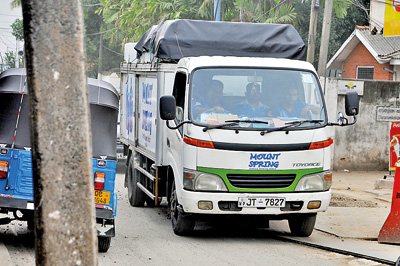News
Utilities move sideways to cut down road digs
The Road Development Authority (RDA) together with the other stakeholders have taken measures to relocate utilities to the sides of roads to avoid probable road excavations.

When there are leaks in underground pipes, which is the case mostly with PVC pipes, roads have to be dug up every now inconveniencing motorists. Pix by Priyantha Wickramarachchi
According to the RDA, ‘utility corridors’ should be adopted because when there are leaks in underground pipes, which is the case mostly with PVC pipes, roads have to be dug up every now inconveniencing motorists.
The Chairman of RDA, Nihal Sooriyarachchi, told the Sunday Times that a cabinet paper will be presented very soon on ‘utility corridors’.
According to him, together with the other stakeholders, a proposal was presented to the Public Utilities Service Commission two weeks ago.
“Focusing only on carpeting the roads and colour coding the pavements is not sufficient. Managing utilities must always be the priority, beautification can be done afterwards,” he said.
Mr. Sooriyarachchi pointed out that acquiring land in the city of Colombo is difficult, but if pipes with a larger diameter are used, then the chances of leakage is rare. He said: “It is difficult to repair roads to the original condition, humps or depression will always appear, hence the solution is to relocate utilities on to the walkways.”
“The background of the city is that it is going through major augmentation projects by the Ceylon Electricity Board, Megapolis Ministry, telecommunication service providers and the Colombo Municipal Council, and safety is a major concern,” Director Engineering Works of the CMC, M.A.C.M. Fazal said.
According to him all of the above agencies have started work simultaneously to speed up the process.
“Every agency and its relevant contractors are responsible for the safety precautions that must be taken during such projects,” he said.
When an unfortunate incident occurs due to negligence on the part of the agency, they will be responsible for paying compensation.
The Project Director of the Greater Colombo water and waste water management improvement investment programme, S.A. Rasheed, conceded that there are some rare occasions where workers tend to temporarily close up road excavations in a hurry, which can lead to accidents.
“Sometimes contractors are unable to finish work by five or six in the morning and the police don’t allow any kind of repairs to be done after the stipulated time. So, temporary measures must be sought to cover up the road excavation,” he said.
However, he said that the recent incident on Reclamation road where a heavily-laden tipper truck sank into a temporarily covered hole had been due to the collapse of the earth support because an underground water pipe broke.
Mr. Rasheed emphasised that contractors have been warned to fill excavated holes with quarry dust and then use a steel plate with a thickness of 32mm, that can bear the weight of any heavy vehicle.
According to the National Water Supply and Drainage Board, the project is set to come to an end in 2022 and until then as a means of rectifying and recovering from mistakes they assured that safety precautions will be taken.
“Safety barricades and sign boards are put up during road excavation for various projects,” Power and Renewable Energy Ministry Director of Development, Sulakshana Jayawardena, said.
He emphasized that approval is always obtained from either the RDA or the CMC depending on whose purview the road comes under before excavating roads for projects.
“Our main aim is to minimise accidents and traffic caused by such projects, and it is the duty of the specific contractor to redo the roads,” he said.
Senior Professor Amal Kumarage of the Department of Transport and Logistics at the University of Moratuwa, condemned the authorities for not maintaining proper methods of safety at road construction sites.
“The public must have a level of assured safety whereby relevant authorities must submit road safety plans and designate officers for safety,” he said.
Prof.Kumarage pointed out the fact that road agencies blame police and motorists for accidents whereas the poor road conditions is the major contributor to accidents.
“The country must move to greater accountability of public institutions where property and lives are at stake,” he said.

